Quarantine Read online
Page 12
So it was hard for Marta to face the men. She knew it would be wise and less embarrassing to spend her days at rest inside the cave, protected from the sun and wind and from the piercing judgement of her neighbours. A woman should be out of hearing, out of sight, when she was sick and volatile. But Marta was too restless to sit still, and too excited by the sober freedoms of the scrub to stay in darkness. Besides, there was no way of avoiding her neighbours entirely. They all woke up before break of light to meet at the water cistern, and to pray – although, of course, a woman could not stand amongst the men in prayers, even if she were not sick and volatile, or tainted by her dreams. Marta had to stand a little distance off, behind their backs, and she was content to do so. If she did not arrive in time for their dawn hosannas in praise of the water and the light, Shim or Aphas shouted her name or let the badu throw stones at the bushes by her cave. They were being neighbourly. ‘Come out and drink,’ they said. ‘It’s almost dawn.’ So she would tie her hair veil tightly round her head to make herself invisible and join them at the grave. Even when Aphas begged her to reach down into the water to fill his cap, she did not speak to him beyond the common courtesies, or show her face. She did her best to close her wings against them all, to hide away the mothy colours of the night, to keep her ardours to herself.
No one there gave Marta much thought, to tell the truth. The men thought only of themselves. The badu grinned at her with an expression which seemed both childish and lascivious – but then he grinned at rocks as well, and rocks could have no reason to be nervous of a grin. The old man wheezed and limped 119 as if his illness was only real if acted out. And Shim had greater matters on his mind than floating into Marta’s cave by night on draughts of air. It was his habit, as soon as there was any light, to impose himself upon the largest rock on the sloping ground below the caves and meditate, his chin too high, his back too straight, his eyes and tongue just visible. He would not speak if spoken to. He let the flies stay on his eyes and lips. He let the lizards run across his hand. He set himself the task of staying still. Marta hardly recognized the man by day. The light was cruel to him. How unexciting he’d become. She would not want his hair in hers. He was a better man in dreams.
She understood, of course, that Shim had reasons to be proud and petulant. Their landlord had humiliated him on that first day. Shim had nearly had his little toe pulled off. She’d seen him shaking with defeat as he hobbled back towards the tent. Musa had the curling staff behind his back. It looked as if he meant to strike Shim down, and when he did not strike him down but chose instead to win with words, then Shim’s abasement seemed complete. Even anger had looked comical and weak on him.
Shim should despise their landlord, then. That made sense. What Marta did not understand, and what neither she nor Aphas could bear to listen to, was Shim’s dismissal of the healer. He hadn’t even spoken to the man, the boy, as far as she could tell. He’d only seen him for a moment, from the brink of the precipice. Yet Shim took every opportunity to ridicule Gally (that had become the name that everybody used) and anyone who took his side.
‘What saintly person would squander a miracle on such a man as Musa?’ he asked Aphas one morning at the cistern when the old man had called a verse for Gally in his prayers. Aphas merely shook his head and shrugged. It was too early in the day and he ached too much from sleep to grapple with the wisdom of the 120 Greeks. Even shrugging made him wince; the pain ran up his veins like fire up oil-soaked thread.
‘Come, come,’ persisted Shim. ‘Won’t you agree with me?’ Their landlord’s story of his rescue from the fever was not believable, he insisted. Musa was a man who would not tell the truth unless there was a price on it. The donkey they had dragged away and dropped was more honest than Musa, and more saintly than Gally. Perhaps it was the donkey, according to Shim’s mischief-making, that had come to Musa in his tent and passed some of its holy water on his head, and pressed its holy hooves on to his face, and plucked the devil out between its teeth. ‘What can you say to that?’
Another shrug from Aphas. And then, ‘There is, at least, a mystery …’
‘Where is the mystery?’ asked Shim, unused to any judgement but his own. ‘It was an animal, perhaps. Or one of our landlord’s cousins put in the cave to make fools of you all.’
No, Aphas would not be shaken from his latest faith. He was sure he’d seen a shape, quite tall, and hardly making any sound as if it floated on the ground. It must have floated down the precipice to reach the cave because, so far as he could see, the entry was beyond the reach of normal men. It was beyond the reach of goats.
‘I felt …’ he said, but did not finish. He dared not use the word enlightenment again. He’d used it once before, only to hear it mocked by Shim: Enlightenment comes to the ignorant. ‘I felt uncertain …’
‘You felt uncertain if you saw a man at all,’ said Shim, beginning to enjoy himself Aphas was not a scholar and the only other audience was a blushing woman and the madcap badu, who betrayed no sign of listening, but at least here was an opportunity for greater wisdom to prevail: ‘A floating shape is not a man. If it were, then – look around – this little valley would seem as populated as a market-place. It’s only the sun and wind that make the rocks and bushes seem to float and tremble. No mystery.’
‘She saw it, too,’ protested Aphas.
‘Our neighbour, yes. The nearly-shadows and the humming rocks that she claims as her experience are not evidence of anything beyond the natural.’ He didn’t point at Marta or even say her name. ‘Who else then? Our fine landlord? You cannot cite his narrative, even if he really thinks he tells the truth. At best, his were the visions of fever. Hot dreams and make-believe. Who hasn’t had a fever, and then seen shapes? But why blame fever when he’s so obviously a drunk? So what is left? The badu’s word? We’ll take his word for it.’ Shim laughed. The badu couldn’t speak a single word. ‘Whose testimony should we trust that there is anybody there at all?’
‘Your own testimony,’ Aphas almost shouted. Had Shim forgotten what he’d said to Musa? ‘You saw him from the top. There’s someone there, you said. You almost dropped the donkey … didn’t … ?’
‘It was the truth. The donkey hardly missed his head,’ said Shim. ‘He looked at me. I looked at him. You see, I have the final word. My logic has you trapped. I’m the only one whose testimony is more substantial than a shape or a shadow or a dream. And this is strange. What should one make of this? Those three of you who did not see him quite, convince yourselves that he’s a healer and a holy man. While I, who stared him in the face, who can describe his nose and chin and ears, can tell you he is not. It seems I have to persevere with what I said. The man’s a boy, at best, collecting eggs or chasing sheep … What’s holy there? And where’s the mystery?’
‘No normal boy could climb down a cliff like that. It’s dangerous. It’s almost sheer,’ insisted Aphas, defeated by Shim’s reasoning but irritated too, and close to tears. At home, he had three sons of Shim’s age, and older. They had been taught to listen to their elders, and to be respectful of every priest and holy man. Certainly they knew it was not right to argue with a dying man, a man in pain. He turned his head away from Shim. He did not want to hear another word. He’d dreamed, like Marta, that the healer’s hand had come into his cave. What else would save his life? He spread his fingers on his side, despairing at the unforgiving ache. He should have put his fingers in his ears.
‘A normal boy will take a chance to snatch some eggs,’ said Shim. ‘All normal boys can climb. The stupid ones take bigger risks. We’re talking of a very stupid boy.’
Marta coughed. She sniffed. She made impatient movements with her legs. The bees inside her melon head rose up in fury. She was surprised that Shim could strike such a cruel note, as if it mattered to him that she – and evidently Aphas, too – needed to believe in healers and in miracles. What otherwise was the point of prayer and fasting, far from home, unless the grating noises of the world could be turned tune
ful by the charms and cantrips of some holy conjuror? Shim’s god might be a god whose greatest trick was curdling milk or taking mould to bread. But Aphas and Marta’s was a god who parted seas to take his people out of slavery, who punished wickedness with floods, who summoned water out of rocks, who only had to whistle for the towers and the bastions to fall. Theirs was a god who showed his hand through miracles.
She’d like to do what the widows of the slaughtered men in Maccabee had done to their false prophets and stuff Shim’s mouth with clay. He’d have to listen then. For once she could be angry in ways which were not approved, a woman shouting at a man. She would be happy for the chance to scream again. This was the scrub. No one would come to help. She’d tell him that she knew his mind. He was clear water. She could see the bottom of his pot. His scoffing at Gally was nothing more than his cowardly revenge on Musa. But Marta was not fooled, she’d say. She had not travelled much, she could not read, but Marta was not mystified by him. She even saw what hid beneath the bottom of his pot. She saw the deeper level to his mockery, and she understood that Shim was simply jealous of the Galilean man.
Shim was a practised traveller to holy places, as he’d told them many times. He boasted that he could read Greek letters, converse in Aramaic, Siddilic and Latin, tell fortunes, compose and sing his own prayers in a voice of mesmerizing evenness, and sit as sinless and as motionless as a pyramid, possessed by half-a-dozen gods, competing with the rocks for soberness. He said that he was used to deference, that he was used to supplicants seeking his advice and wisdom. At religious gatherings throughout the provinces more simple pilgrims than himself — and that included the likes of Marta, Musa and Aphas – would treat him as the pious and the holy one. They’d seek him out. They’d kneel to touch his gown. They’d give him alms and shelter for the night. Why should he not expect the same to happen in the scrub? His landlord and the quarantiners ought to come and stand a little distance from his cave. They ought to pray for him to drive their spirits and their fevers out. They ought to sit in hopes each day that his portentous shadow would fall on theirs. Instead, he was ignored at best, or made to look a fool, or argued with by one – Aphas — whose character was not enhanced by travel, or another – Musa — whose mind was not refined by study. Instead of deference and alms, he had a dislocated toe. And all these simple pilgrims in the scrub were seeking help and wisdom from some meekling youth whose only credo seemed to be that it was wise to turn his cheek against the light and cower in his cave.
‘Or else we frightened him,’ he said, to end his conversation with Aphas. ‘That is the measure of his holiness. He scrambled down. He hid inside the cave and now he’s stuck. He can’t climb up. He’s too ashamed to show his face. He’s sucking wild birds’ eggs for food, and praying for rain. Perhaps we ought to go with rope and rescue him.’ With that, he shut his eyes and settled down to meditate, his fingers spread out on the rock, with just an eyelid flickering to show he was alive, like a lizard boasting in the sun.
16
God had not provided a ready-dug cistern for his Galilean son to take his water from. There were no rock pans by the cave for the dew to gather. Or any salt shrubs within reach, so that Jesus could tear his nails off digging for their liquid roots. There were no barrel bushes with their wax skins, or tamarisks with hollow, swampy trunks. If there had been any spring plants, vain enough to defy the precipice’s nude and excavated rocks, then they had already flowered, seeded and retreated underground into their bulbs. Jesus searched inside his darkened cell but he could not find any sopbugs, their knapsacks full of pap, which could provide some short-lived moisture for his tongue with their sweet explosions. There were no nesting birds, or bats, or even any ants to eat, so far as he could tell. There was no rain. He thanked the lord. He’d found a place opposed to sin and nourishment, and he could starve himself of both without distraction. God in his generosity had removed all earthly sustenance and cleaned the cave of all temptations. Jesus only had to conquer his tormentors on the promontory – and time, of course.
A single silver bush was growing in a seam of marl above the cave, scarcely showing leaves. It spread its skeleton across a rock as if it meant to suck the quartz from it. It drank its colour from the stone. Jesus jumped to snatch the lowest leaf, an oddly adolescent act, but men are boys when they are bored. He was surprised and gladdened by the effort that his jumping took, how tired and jarred he felt. It meant he was already weakened by his fast and that much closer to god, therefore. He hardly touched the leaf, but it snapped its stem and fell into his hair as dryly and as heavily as furnace scale. He would not put it in his mouth. He would put nothing in his mouth for all the quarantine. He would not even break his fast at night, unless it was with help provided by his god, a meal placed at his head by angels while he slept (as god had provided a cake baked on hot stones and a pitcher of water for Elijah’s forty days of fasting). But even though he would not place the leaf on his tongue he was still curious to see what sustenance the precipice might give to him. The moist leaves of a pair bush, common in the scrubland by the tent, could be rubbed on to the lips or sucked for sweetness. A sprig of morning star, tucked between the teeth and lower lips, would taste of peaches for a day. But this was only canker thorn. He snapped the silver leaf. It fell apart like ash. No sap.
By now he had no sap himself He’d urinated two or three times on that first evening when he’d climbed down the precipice and taken up his residence, and that was normal. He’d always had a nervous bladder, forever wanting to pass water in the middle of the night or as soon as the priest began his readings from the written laws and no one could leave the temple without offence. He’d learnt to put his discomfort to good use: his bladder was a messenger from god, a sign of his unrighteousness. It was said by some of the older family that possession by spirits or by unclean thoughts was marked by such an excess of fluids. Sneezing, vomiting, a salivating mouth, diarrhoea, passing too much water – these were all signs that evil was in residence. It should be first resisted, then forced out. His bladder woke him in the night with a purpose, he told himself — it was an opportunity to say more private prayers, to practise tongues, to quietly endure the ache, the guilt, until dawn for fear of waking up his parents or setting off the hens if he went outside to urinate. Likewise, his bladder plagued him in the temple when he sat cross-legged before the speaking scroll so that he had the opportunity, not given to the other worshippers, to battle with his imperfect body for the glory of his god.
It was in part a pleasure, then, and in part a self-indulgence devoid of any glory, to be able to empty his bladder as he pleased. Once he’d settled on the precipice, he could obey his impulses at once, and edge along the cliff-face as far as was safe, to pass his water where it would not contaminate his cave but without regard to parents, temples, hens. Such open privacy had not been possible in the Galilee.
Here was a man who was in the mood to divine grand meanings in the simplest acts. There’d be no god without such men, prepared to make the little cause responsible for large effects, quick to find the lesson in the most everyday events. So it did not go unnoticed that his first day’s urine was produced by drink stolen from the merchant’s water-skin which he had lifted from the awning of the tent. It had only been a sip, the merest sip, and Jesus had drunk nothing since. But if there had been any sin or lack of charity on his part, then it would show its stains. There would be murkiness. These early waters had been copious, though, and odourless, and clear, and free of guilt. But by the end of the second day of fasting his urine was already dark brown, like pitch water. It sank into the ground too thickly and with cloudy bubbles. Even Jesus, whose sense of smell had not recovered from the journey, could recognize the eggy fragrance of sulphur. This was the devil’s urine and Jesus’s bladder had become a battle-ground. The patch of watered dust dried within a few moments. He scuffed it with his heels. He was contaminated by himself but he could not expect a ritual bath for weeks.
On the third day of
his quarantine, he had to go along the cliff a dozen times. He stood and waited with his back turned to the sun to no avail, and then he tried again, facing outwards towards the sea, but he was completely drained already. He strained himself until it burned and stung. He pressed his bladder with his fingertips. The impulse to pass water did not go away, but he showed nothing for his efforts, except, again, the thinnest trace of sulphur in the air. He could not wet the soil. His body was an empty bag.
This was a lesson he would not forget: water is more valuable than gold. He hunted for the well-shaped proverb. That was the line that he could preach when he got back to the Galilee. He briefly saw himself outside the temple gates on market day, raised on a cart, with sermons for the multitude. An empty purse is better than an empty pot, he’d say, and his neighbours in the audience would put their hands across their mouths and whisper, It’s Gally, see. Listen to him now. We never knew him after all. But for the moment he was more concerned with his own empty pot. Perhaps he had been arrogant and profligate. He almost wished he’d saved the urine that he’d passed so easily on the first day. To break his thirst, if he grew desperate. Let god forbid that he was ever as desperate as that. He’d heard tales of badu who in a drought would drink their own waters and the acrid waters of their camels and think nothing of it, but badu lived close to the earth, like animals themselves. The water that they normally drank from wells was bladdery, and shared with all the desert creatures anyway. The badu had no god to satisfy, or rituals to obey. They did not have to wash their taints away. Jews, though, were a people governed by the laws brought down by Moses from the mountain, and cleanliness of body and of spirit were the paving stones to god. Those that forsook the laws, Isaiah said, would be consumed.

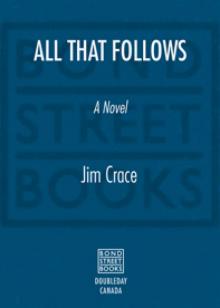 All That Follows
All That Follows Quarantine
Quarantine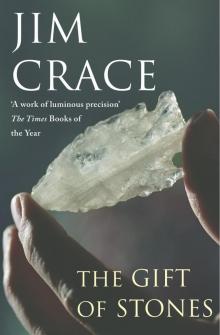 The Gift of Stones
The Gift of Stones The Devil's Larder
The Devil's Larder Genesis
Genesis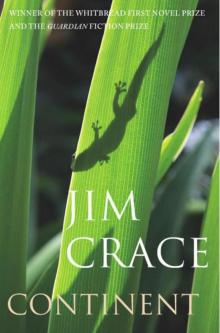 Continent
Continent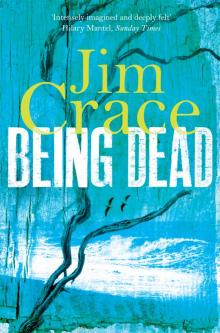 Being Dead
Being Dead Harvest
Harvest Signals of Distress
Signals of Distress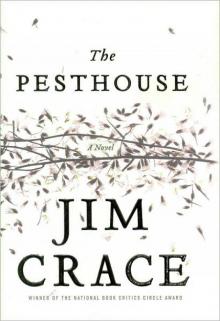 (2007) The Pesthouse
(2007) The Pesthouse